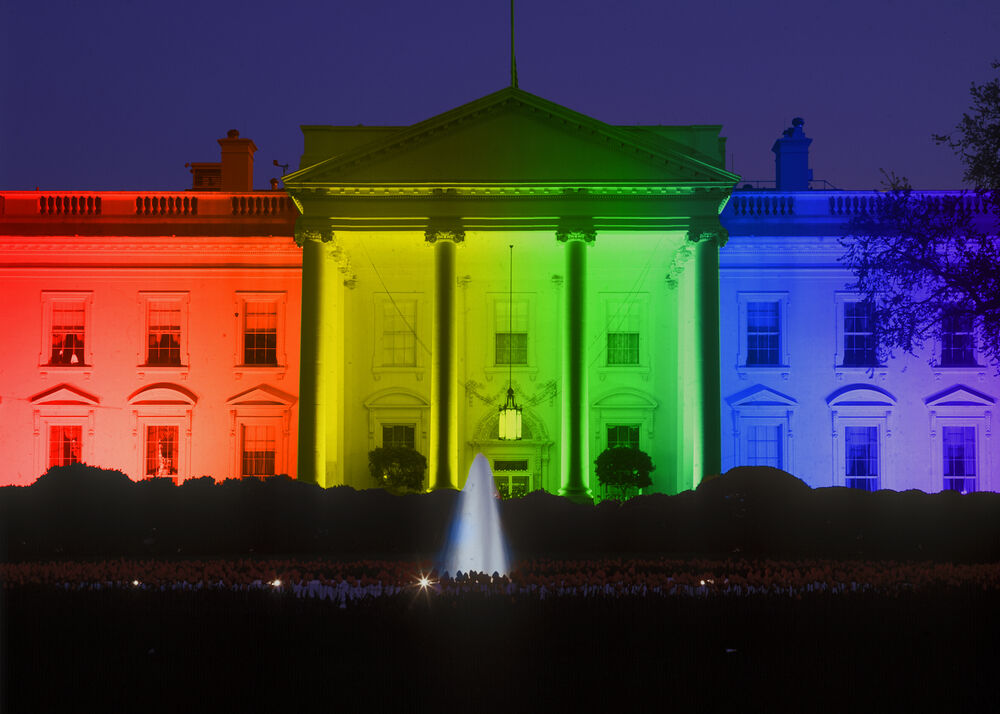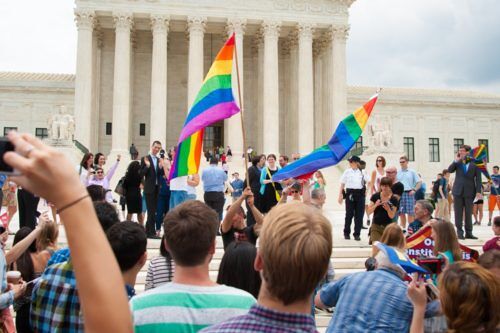
A week after he lost the fight against marriage equality in the landmark case bearing his name, Rick Hodges stood up at his gay friend’s wedding and read a passage from the Bible about love. When his friend asked him to participate, there wasn’t any question he’d do it; the only thing Hodges had felt since he lost the case was relief.
“He was on our side the whole time,” Jim Obergefell – the plaintiff in Obergefell v. Hodges, the 2015 Supreme Court decision that legalized marriage equality in all 50 states – recently told LGBTQ Nation, still a little in awe at the twist in their story.
Related
No union more profound: LGBTQ Nation celebrates 10 years of marriage equality
The June Edition of LGBTQ Nation is a look back at the last 10 years, as well as a look forward at the work that still needs to be done.
“I was a reluctant defendant,” Hodges added.
Never Miss a Beat
Subscribe to our newsletter to stay ahead of the latest LGBTQ+ political news and insights.
Subscribe to our Newsletter today
The wedding that day was for a college friend who’d been politically active in Republican politics with Hodges for years. Just about the entire Ohio Republican leadership was at the ceremony, including then-Gov. John Kasich.
Hodges read from the Gospel of Matthew: “Teacher, which is the greatest commandment in the Law?”
“Jesus replied: ‘Love the Lord your God with all your heart and with all your soul and with all your mind.’ This is the first and greatest commandment.
“And the second is like it,” Hodges quoted. “‘Love your neighbor as yourself.’”
The difference between 10 years ago and today couldn’t be starker. It’s like somehow I ended up in an alternate timeline, in a different world.
Jim Obergefell
The words summed up Hodges’ feelings about the case and described a shared rationale for marriage equality on which those Republicans and all Americans could agree.
But ten years after Obergefell v. Hodges made it the law of the land, marriage equality is under threat, and Hodges’ lesson may have fallen on deaf ears.
A changed world
In only the first few months of his second term, Donald Trump has unleashed a torrent of hate directed at the LGBTQ+ community, vilifying trans people and erasing LGBTQ+ identity from the federal government, the military, arts institutions, and schools.
Secretary of Defense Pete Hegseth is literally painting over Harvey Milk’s name on a U.S. Navy ship.
Support for marriage equality is down in lockstep with an unprecedented effort by MAGA Republicans to strip LGBTQ+ Americans of their rights to everything from gender-affirming care to Pride celebrations. Nearly two-thirds of Republicans now oppose marriage equality, up from just under half.
The hateful rhetoric from the top has inspired vitriol online, just as social media platforms have abandoned moderating hate speech.
In the real world, newly emboldened anti-LGBTQ+ activists are invading LGBTQ+ spaces to preach their message of hate and Christian nationalism.
And a Supreme Court stacked with a conservative majority by Trump in his first term has at least two justices on the record calling for Obergefell v. Hodges to be overturned.
What felt like an inevitable march forward toward equality and justice – for LGBTQ+ people, women, and every other American who isn’t straight, white, Christian, and male – now seems stopped in its tracks. Or worse.
But there is a counterpoint to that increasing animosity, in the unlikely friendship of the two men now forever associated with marriage equality.

“Any interest in meeting Rick Hodges?”
A year after the Supreme Court decided Obergefell v. Hodges, a mutual friend called the plaintiff with a question.
“Any interest in meeting Rick Hodges?”
Obergefell laughed when recalling the invitation.
“My response was, ‘I don’t know, you tell me. Do I want to meet Rick Hodges?”
While Obergefell was a media magnet in the run-up to the decision, Hodges declined interviews with the press and stayed out of the courtroom. Obergefell didn’t know anything about him.
“I guess I created this image of Rick as the Big Bad Wolf,” Obergefell said.
“Typically, when you see a court case, there’s that ‘v,’ which means there’s an adversarial relationship. So, I knew nothing about Rick other than he was the head of the Ohio Department of Health.”
We’re all created in the likeness and image of God, and when you see a person, you’ve got to realize that’s who you’re talking to: somebody who’s created in the image of God, who deserves the utmost respect.
Rick Hodges
Hodges, a Republican who served three terms in the Ohio House of Representatives, was appointed director of the department in 2014. Obergefell and his husband initially sued Gov. Kasich and then-state Attorney General Mike DeWine (R) for recognition of their out-of-state marriage, but were asked to replace those names with Hodges’.
The reluctant defendant avoided the case as much as he could.
“I never sat in court or attended any of the events where Jim would have been,” he said. “But I had the benefit of knowing my attitudes and motives. Jim didn’t.”
Those “attitudes and motives” were a revelation to his opponent.
“I don’t know if congratulations are in order, because this came out of your loss,” Hodges said to Obergefell when they finally did meet, referring to how Obergefell’s husband John Arthur’s death was tied up in the reason he sued for his marriage to be recognized. “But congratulations. And just so you know, I was never so happy to lose in my life.”
“We became fast friends that day,” Obergefell said.
Jim and John’s marriage: “This is not a complicated case”
Over coffee at a hotel in Columbus, the two men — one a gay atheist, the other a straight Christian conservative — shared thoughts about their values, the case, and who they were outside of it.

“We both value humanity,” Obergefell learned. “We both value the individual. We both value the right for everyone to live a fulfilling life that’s filled with dignity, love, and respect.”
“That just comes from my faith,” Hodges said. “We’re all created in the likeness and image of God, and when you see a person, you’ve got to realize that’s who you’re talking to: somebody who’s created in the image of God, who deserves the utmost respect.”
Soon after they met, Obergefell and Hodges took their shared values on the road – with joint appearances to talk about the case and their friendship – at colleges, high schools, and civil rights organizations around the country.
Their message isn’t about tolerance, Hodges said. “It’s about embracing diversity and rejoicing in it.”
Hodges came up in the Ohio Republican Party in the Reagan-Bush era, when Jerry Falwell, Phyllis Schlafly, and Pat Robertson were, in his words, “striking fear in the hearts of liberals everywhere” and AIDS was called the “gay plague.”
“I went to house parties with those people. I remember one in particular that every one of those names was there, and it’s just so interesting to me, because that personal animus was not there.“
“But the political animus certainly was,” he added.
That was the climate that his gay friends were living in.
“When I graduated from high school, I would have told you I didn’t know any gay people,” Hodges said. “But quite a few friends came out to me, a number of them because they were dying. The fact that my friends at the time couldn’t feel safe sharing with me who they were has always really bothered me. That was some of the vindication in this case.”
Around the same time in the early 1990s, Obergefell and Arthur met at Uncle Woody’s, a bar near the University of Cincinnati. They started dating and moved in together.
In 2011, Arthur was diagnosed with the degenerative nerve disease ALS.
Just months before his death, the couple flew by private jet with a nurse to Maryland, where they were married by Arthur’s aunt as the jet sat idle on the tarmac. It was not the romantic wedding the couple had always hoped for.
“It was hard for me to think it was too romantic when we were forced to do things that a straight couple would have never had to consider,” Obergefell said. “The most romantic thing would have been to take him the six blocks to the Hamilton County courthouse, get our marriage license, and get married at home where he was safe and comfortable.”
Same-sex marriage had been outlawed in Ohio since 2004, when both the Ohio Legislature and voters approved separate measures banning it.
Arthur died three months after the couple’s Maryland wedding.
Before he died, Arthur and Obergefell’s attorney, Al Gerhardstein, explained that their marriage wouldn’t be recognized on Arthur’s death certificate. The couple decided to file suit in U.S. District Court.
“This is not a complicated case,” Judge Timothy Black wrote in the opening line of his decision in their favor.
Attorney General DeWine appealed Black’s decision to the 6th District Court of Appeals, which ruled against Obergefell in November 2014.
The widower was among dozens of plaintiffs in multiple marriage equality cases that appealed losing decisions to the U.S. Supreme Court. Gerhardstein filed his paperwork just ahead of the other plaintiffs, and that meant the consolidated case bore Obergefell’s name.
And Hodges’, too.
The decision that changed a community
While the case bore his name, Hodges was determined to stay above the political fray. For one thing, he had his employees at the Department of Public Health to consider.
“Nobody should have to come to work feeling threatened because of who they are,” Hodges said. “We had a large and active LGBTQ employee group, and I felt really bad that those people were coming to work for an organization that was the opposition to who they were, at least in court. I wanted to make sure that they knew this was process, and we value who they are and what they do.”
Hodges told the governor’s office he wouldn’t advocate for the case, and they responded that they had no problem with it.
“That would not happen in 2025,” Hodges said.
“It would turn into a red meat issue to try to radicalize the base and take advantage of people who were vulnerable to that kind of anger, and that’s something that’s changed in the last 10 years. Whether it’s a consequence of President Trump or whether he’s just a symptom of the problem, I don’t know. But it’s gotten — it’s disappointing, is hardly an appropriate word for it. That’s a severe understatement.”

Things felt very different on June 26, 2015.
“Al told me later he’s never seen so many attorneys crying in a courtroom,” Obergefell said of his lawyer as the decision was handed down. “You could hear people around the room sobbing.”
Seated with Gerhardstein in the packed court chamber, Obergefell burst into tears as Justice Anthony Kennedy read from the bench. He dwelled on his husband, whose death, and Ohio’s refusal to recognize the couple’s marriage in the aftermath, brought Obergefell v. Hodges to court.
“My first thought was, ‘Oh, John, I wish you were here. I wish you could experience this, and I wish you could know that our marriage can never be erased.’”
The winning plaintiff took a congratulatory call from President Barack Obama on the steps of the Supreme Court that day, and crowds gathered spontaneously in gayborhoods across the United States to celebrate. It really did feel like the arc of the moral universe was bending toward justice.
America has changed in 10 years
Both men lamented the change in politics since that historic day. Just ten days earlier, Trump rode down his golden escalator into the first of three hate-filled presidential campaigns.
“The difference between 10 years ago and today couldn’t be starker,” Obergefell said. “It’s like somehow I ended up in an alternate timeline, in a different world.”
“We have all of these hateful state-level bills that are being proposed and passed: Don’t Say Gay, Don’t Say Trans — so many things that are dehumanizing an entire group of people who want nothing more than to live their lives on an equal footing.
“There’s the fact that state legislatures have passed resolutions calling on the Supreme Court to overturn Obergefell, and we have two Supreme Court justices who’ve made it very clear that they want to overturn it.”

He pointed to Clarence Thomas and Samuel Alito.
In 2020, Thomas wrote for both justices, saying, “Obergefell will continue to have ruinous consequences for religious liberty” and “the court has created a problem that only it can fix.”
A “novel constitutional right” was cited again in 2022, when the conservative majority overturned Roe v Wade. In his concurring opinion in that case, Thomas again called on the court to overturn Obergefell.
The 2022 decision upending Roe coincides with Republicans’ peak support for marriage equality. It’s dropped 14 points since. Their view of the “moral acceptability of same-sex relations” has dropped even further, from 56% in 2022 to just 38% today.
Those growing negative views have been stoked by MAGA Republicans, anti-LGBTQ+ Christian activists, and members of the online “manosphere” in their search for votes and affirmation, portraying the LGBTQ+ community as predators and the “other.” Even Sesame Street is under attack for “grooming” for merely acknowledging Pride.
If you believe social media represents America in 2025, then society is fracturing, outrage and hostility are driving everything, and people are gravitating toward others with similar opinions in a phenomenon known as homophily.
Finding shared values like “love thy neighbor” in this environment feels more and more like a lost cause at a time when the manosphere and flame-throwing activists like Valentina Gomez would probably call that “gay.”
But what if it’s not?
What if, under all the online noise and hateful legislation and executive diktats, there really are decent people like Hodges, who are on your side and you just don’t know it yet?
“Rick exemplifies what it means to be a public servant, doing the best for everyone he serves,” Obergefell said. “During the case, he made the very conscious decision not to do anything other than make sure the entire Ohio Department of Health was ready to go when, as he said, ‘We lose. Because the state should lose.'”
Just doing his job without taking sides became a form of protest for Hodges. How many like him are left in government now, and can they also manage to just do their jobs, when Trump and his allies have politicized everything, everywhere, all at once?
“It frustrates me to no end that these issues are being brought up as a way to keep stoking the anger and the passions of a minority of the population, whether it’s to obtain power or money from them,” Hodges said.
“But if you talk to people privately, there’s not a whole lot of Republican support for Donald Trump, at least among the Republicans I talk to,” Hodges said. “And it doesn’t take that much courage to say, ‘This is wrong, and I don’t fear consequences.’ Maybe there will be. There can always be consequences. But if you live your life in that kind of fear, you don’t have much of a life at all.”
Subscribe to the LGBTQ Nation newsletter and be the first to know about the latest headlines shaping LGBTQ+ communities worldwide.